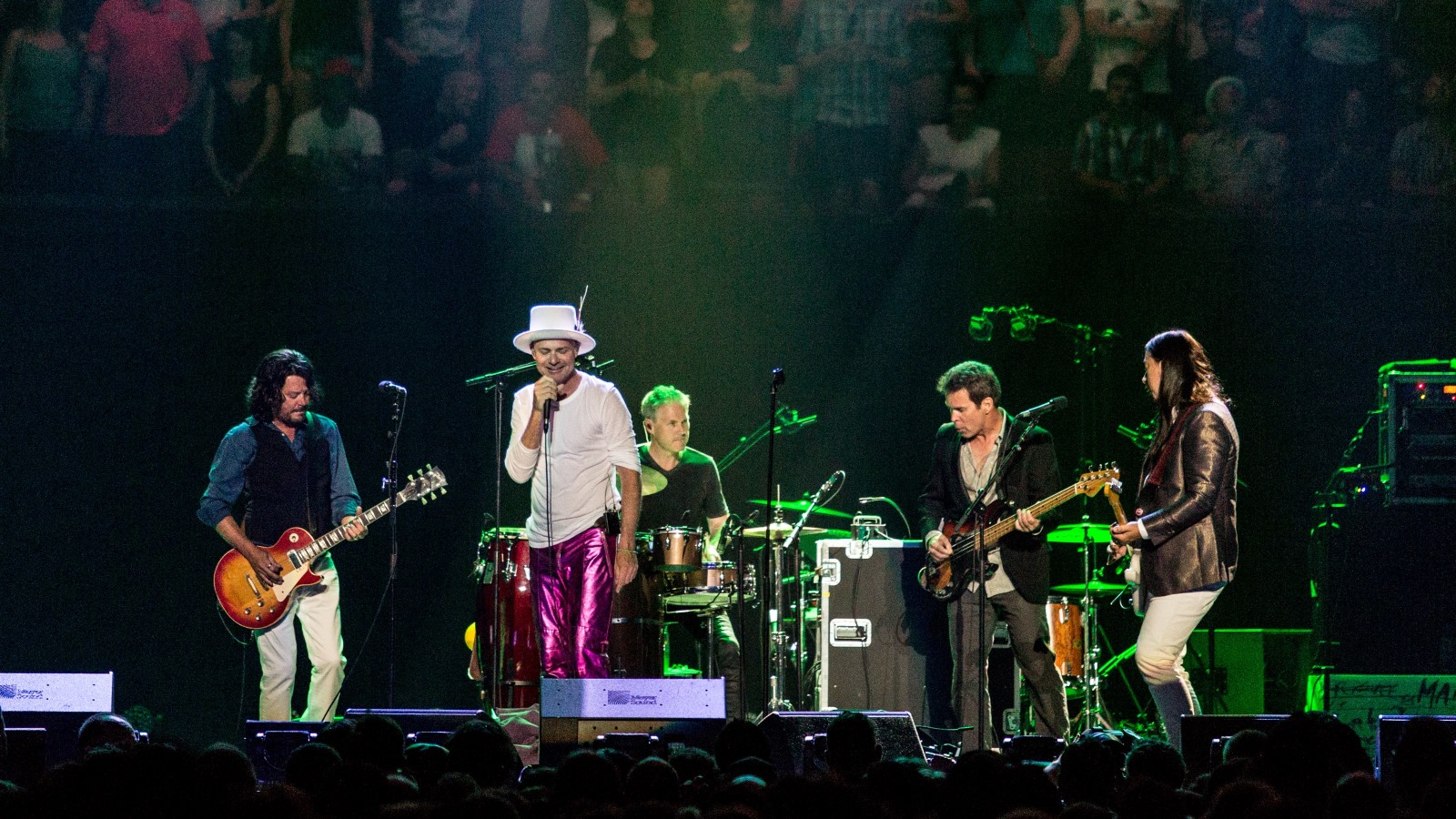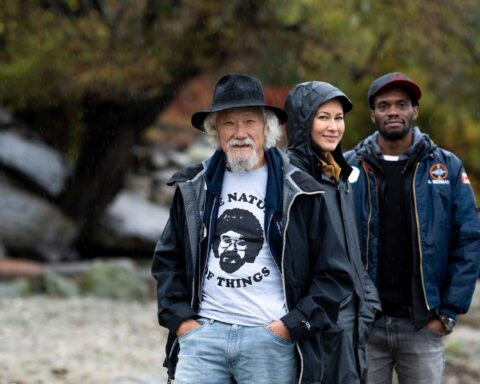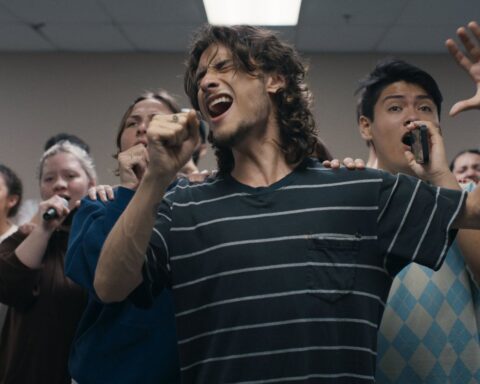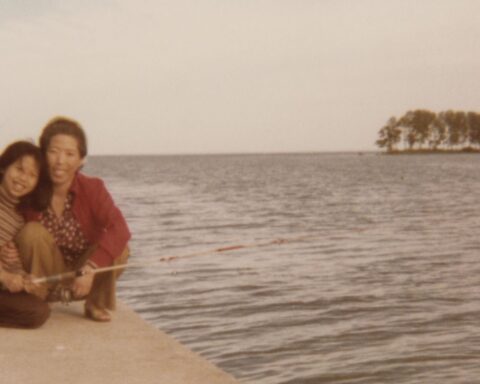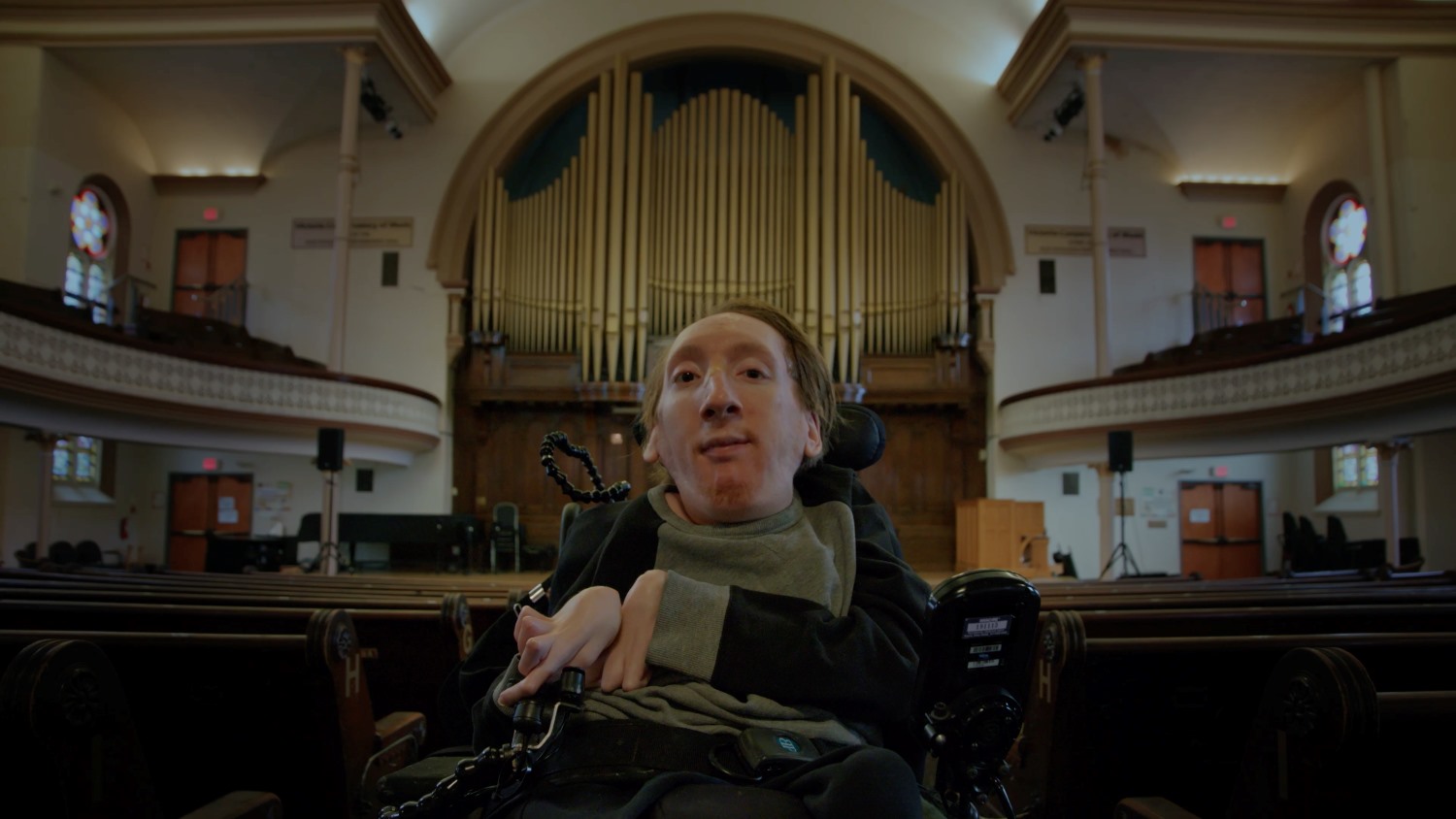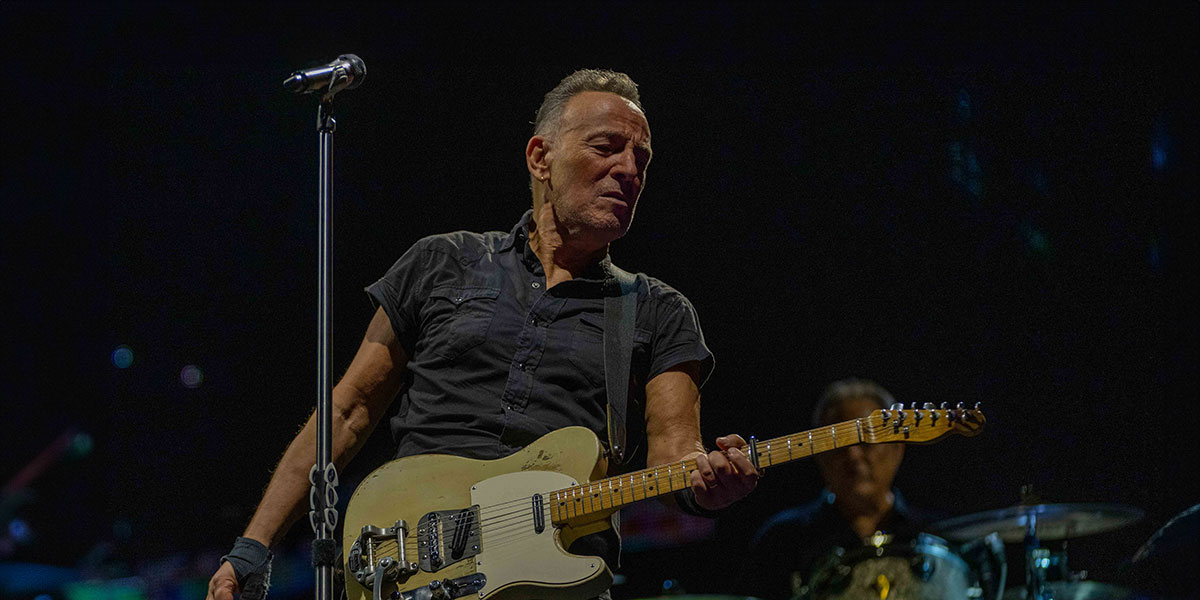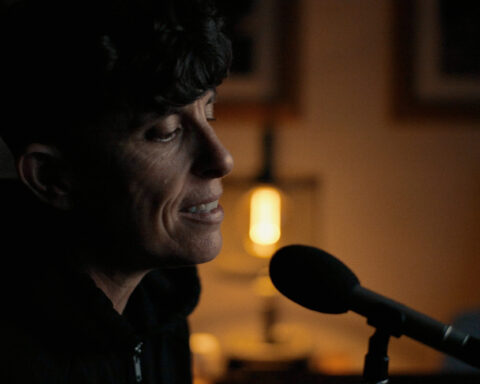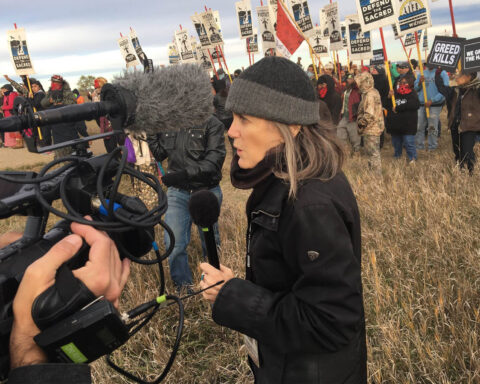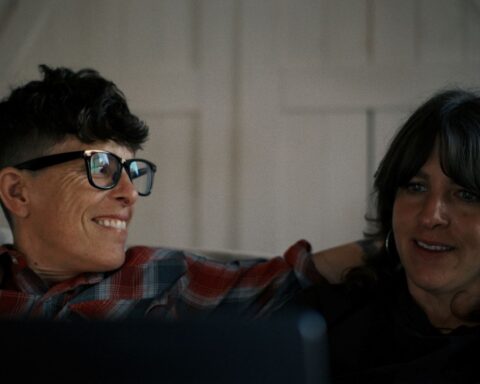“There were a lot of moments where people’s emotions in the interviews were brought to the surface. You start talking about these stories and the place that it holds in their hearts: the Hip’s music and what they stood for,” says The Tragically Hip: No Dress Rehearsal director/producer Mike Downie. “The band kind of went away with Gord’s passing. It wasn’t even a big memorial. There was no big public piece to it.”
“Gord” obviously refers to Downie’s late brother Gord Downie, who fronted the singular Canadian rock band The Tragically Hip from 1984 until his death in 2017. No Dress Rehearsal, a four-part documentary series premiering at the 2024 Toronto International Film Festival and streaming on Prime Video this fall, offers a definitive look at the Hip, tracking the band from its genesis in school dances and Kingston pubs, through hit albums, massive tours, and a 2016 farewell that brought Canada to tears. More than mere biography, though, No Dress Rehearsal illustrates how The Tragically Hip united generations of Canadians with music to proudly call their own. The series marks the 40th anniversary of The Tragically Hip and coincides with a re-release of their album Up to Here and a companion book that offers the oral history of the band.
No Dress Rehearsal features some of Gord Downie’s final interviews, along with conversations with Hip band members Rob Baker (guitar), Johnny Fay (drums), Paul Langlois (guitar), and Gord Sinclair (bass). For a band that spent years in the spotlight, the Hip generally managed to restrict the conversation to their music—until now.
Our music at work
Downie says he interviewed the Hip in October 2021, after they all had time to properly grieve his brother’s passing and to process the impact of a group that had played together for decades.
“Gord had been gone four years, and it was just the right amount of time to start to talk about all the things that had happened. There was something to the fact that the timing was right,” says Downie. “If you don’t have that timing right, they’d just be like, ‘I don’t really want to talk about that.’”
Narratively, the doc takes a chronological route with the first episode charting the formative years of the Hip as Baker and Sinclair tell how they started playing as Rick and the Rodents before hooking up with Downie on vocals and Fay on drums. Langlois explains how he joined two years later on second guitar after the Hip enjoyed a blip with American draft dodger Davis Manning on saxophone before he disappeared as quickly as a Spinal Tap drummer.
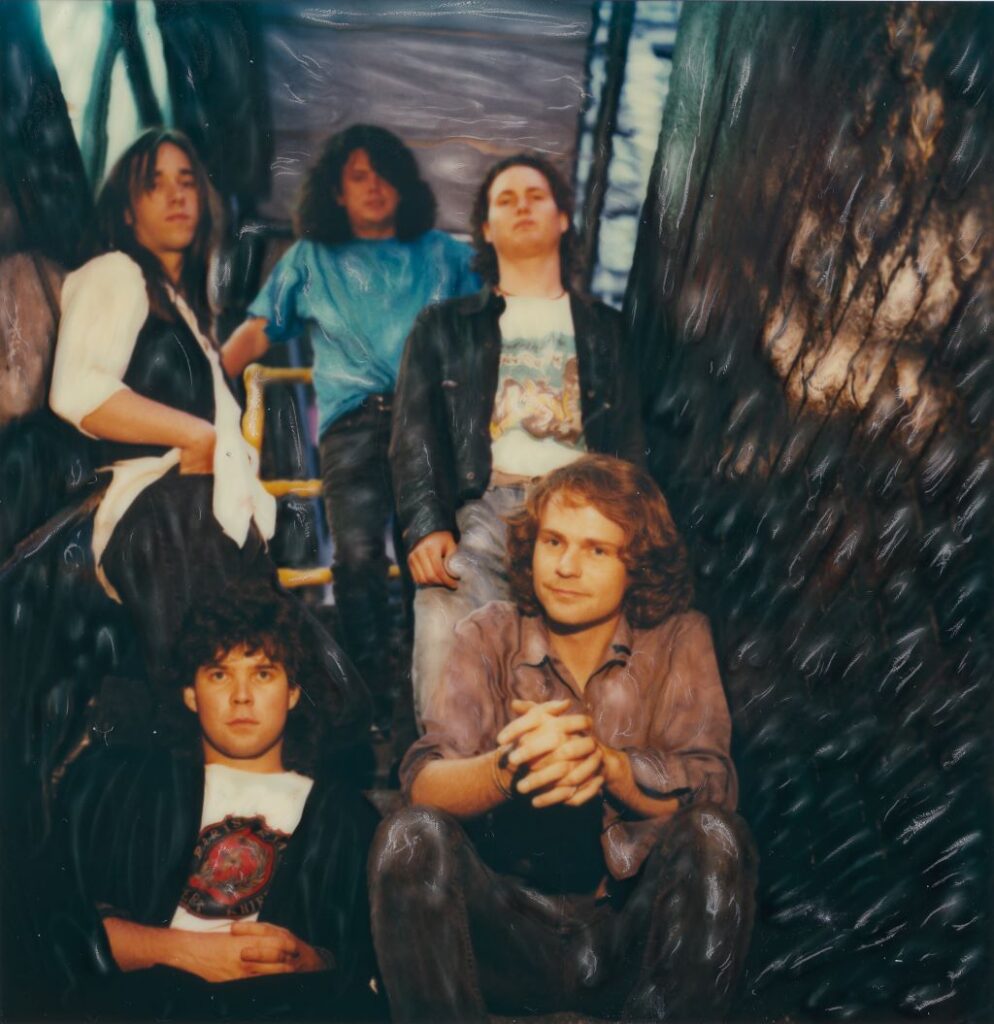
Manning’s appearance is one of several bits of Hip lore that should delight fans. The band’s early sounds endure through extensive archival material. No Dress Rehearsal captures Hip history with a collage of MuchMusic appearances, in-studio jam sessions, rare concert footage, and a gold mine of ephemera—posters, concert tickets, you name it.
Jake Gold, the Hip’s manager from 1986 to 2003 and then from 2020 to the present, says the doc is part of a massive “archaeological dig” of Hip history. “There were three and then two full-time archivists scanning, taking pictures, moving stuff around. It took over a year to build it,” he explains. “Universal Music and Johnny Fay, who was kind of the music archivist, dug up all the old music.”
A front row seat
On the video front, No Dress Rehearsal similarly offers rare finds. Archival nuggets draw upon a who’s who of filmmakers tasked with chronicling the Hip over the years, including Revolver Films’ Don Allan, who shot 16mm footage on the road during 1991 and 1992 for a CBC special, while Mark Williams, who shot the “Nautical Disaster” video, offered backstage shots from the Hip’s first performance at Maple Leaf Gardens. There’s also snippets from the band’s 1993 cross-Canada concert Another Roadside Attraction with Australia’s Midnight Oil, footage of them rocking Woodstock ’99, clips of the Saturday Night Live cast watching in awe as the Hip flubbed their own lyrics on TV, and fuzzy shots from a gig at the Toucan pub where Queen’s University students and Kingstonians witnessed history in the making.

The doc conveys the experience of being at a Hip show. “Some of this footage is so rare and hasn’t been seen before, so we were always going to lean on the side of longer performance takes,” notes Downie. “We weren’t going to drop in a verse and then have somebody start talking over. When we had the material, we were going to let the song tell its own story because it’s live performance and it’s The Tragically Hip and that’s really how they built their career.” Audiences can join in with the crowds singing in unison about a “late breaking story on the CBC” or get a taste of Gord Downie’s sweaty performance style in which he seems electrified by the crowd’s energy.
Gold adds that the emphasis on live performance mirrors the “fan first” philosophy with which the Hip built a constituency “We played smaller places, multiple nights,” he notes. “We could have been playing arenas on the first album if we wanted. We waited until Day for Night to start playing arenas because we wanted the intimate stage experience for the fans. We wanted it to be a rite of passage for people.”
The flags on our backpacks
Besides leaning into the live performances, Downie draws upon archival material sometimes to chronicle the Hip’s genesis. “You get into ‘38 Years Old,’ and we have the archive of it with Gord describing this prison break that happened literally three miles from where we grew up and the summer that it happened,” says Downie.

One could easily fill a documentary (or an article) name-checking all the Canadiana in Hip songs, whether it’s a creative license with a shipwreck story in “Nautical Disaster,” the words of author Hugh MacLennan in “Courage,” or the iconic loon call in “Wheat Kings” that brought a lawsuit by the bird’s original recordist. (“A lesson in sampling,” Gold calls it.) At a time when it was the norm to remove license plates from Canadian movies, No Dress Rehearsal shows how the Hip didn’t just keep their plates valid: They proudly made them part of the song.
The documentary offers license plates of its own, like an establishing shot at Morrison’s diner and the band’s high school, KCVI (Kingston Collegiate and Vocational Institute) as a site for early interviews, which evoke the Hip’s art for rooting music in a sense of place. The documentary deservedly credits the Hip for owning its Canadian roots. “Bruce McCullough said it really well in the doc: ‘The band did a great job of reminding us that our history is now, and it’s not long ago. It’s what’s actually happening around us with our brothers, and our fathers, and our sisters, and our friends,’” says Gold, echoing George Stroumboulopoulos’s point that the Hip wasn’t overtly patriotic.
“When we’d be in Canada, you never saw a Canadian flag. But as soon as we were in Europe or the States, the flags would come out. Gord used to introduce ‘50 Mission Cap’ as ‘the flag on your knapsack.’”
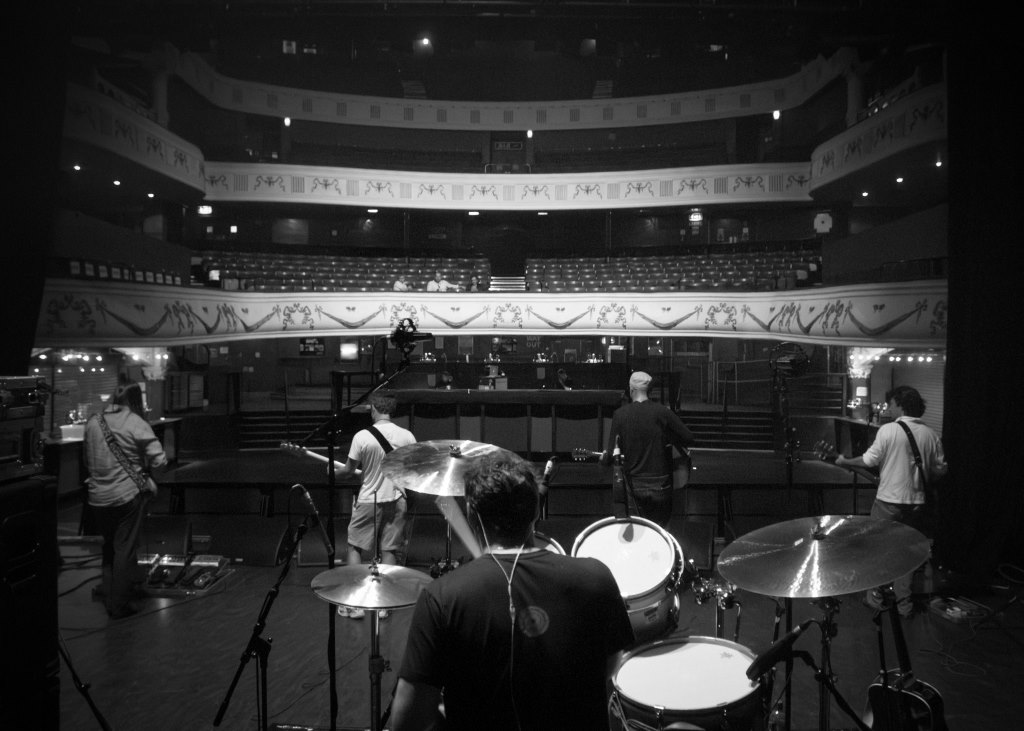
Tortured poets
But while No Dress Rehearsal likens Gord Downie to the Al Purdy of Canadian rock with his regionally flavoured lyrics, the documentary also positions him as a founding member of the Tortured Poets Department, to take a line from Taylor Swift. The group revisits infighting including the well-known fact that they shared credit for the songs no matter who wrote them. But emotions run high as they consider how Downie brought the band to that agreement by saying that he’d sing his songs and nobody else’s.
There’s tough love, too, when the band looks back at the day they parted ways with Gold. In the doc, Downie presents Gold with the original letter his brother read to him telling it was time to move on. “I’ve watched myself get fired 35, 40 times already,” Gold admits, noting that he had no idea that Downie had the letter until they started filming. Gold says they had an agreement to tell the truth of the band from the outset no matter how hard it was for everyone.
“The funny thing is that our agreement was that the band would see cuts, obviously, but the biggest pushback I ever got was music related,” Downie adds. “The notes were mostly about music production, that maybe it was not a very good version of a certain song.”
Trouble at the henhouse
When it comes to having hard conversations about his brother, Downie says they had to be honest, even as interviewees like George Stroumboulopoulos admit to seeing signs of trouble but ignoring them. The interviews get very frank about the creative malaise that hit partway through their career.
Sinclair, Baker, Fay, and Langlois recall how the Hip attempted reinvention by enlisting producer Bob Rock for 2006’s World Container and 2009’s We Are the Same. They share how Gord Downie sided with Rock, alienating himself from the group while trying to meet the bar they’d set for themselves, ironically with a producer who specialises in dad rock.
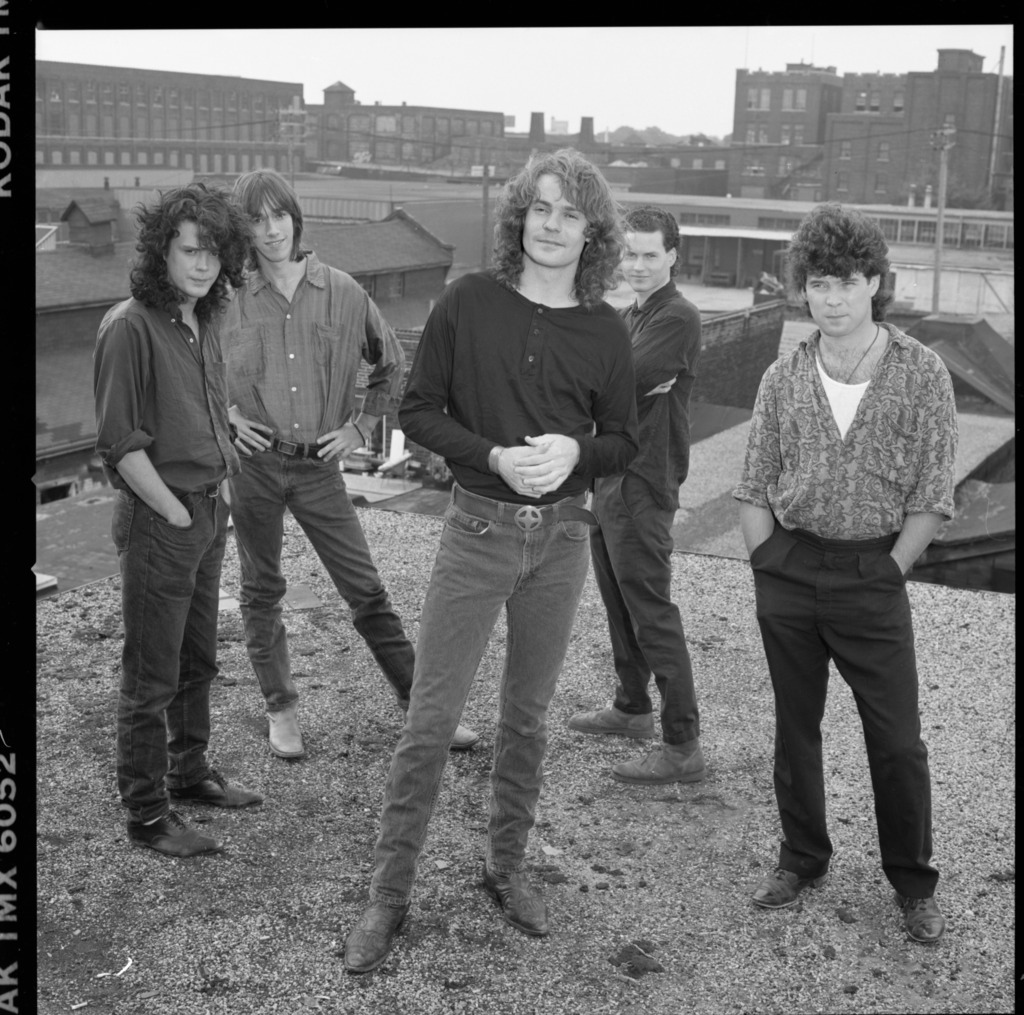
Baker admits that he’d immediately pour a drink when Downie entered a room, while Langlois and Sinclair display unexpectedly naked emotions while remembering how Downie and Rock recorded back-up vocals on We Are the Same without them, and essentially fired them from their own album aside from one token track. “We are not the same,” Sinclair says of the album pointedly.
While Rock may serve as something of a villain in the Hip’s story, No Dress Rehearsal should invite reappraisal of those albums. Moreover, they serve as a bridge to the band’s swan song as the doc’s final episode makes clear that The Tragically Hip redefined what it means to succeed at home while creating distinctly maple-toned music that could bring Canadians together no matter where they found themselves.
Uniting the nation
No Dress Rehearsal reaches an emotional climax with images from the 2016 Man Machine Poem tour, which harnessed a groundswell of support from coast to coast as the Hip signed off following Gord Downie’s brain cancer diagnosis. It remains a touchstone of contemporary Canadian culture as the Hip’s last concert in Kingston, broadcast and livestreamed by the CBC, drew 11.7 million Canadians (one third of the population), while the sight of Prime Minister Justin Trudeau addressing the nation in tears one year later following Downie’s passing marks a rare commemoration for a Canadian artist. The doc also features an interview with Lindsay Pereira, who wrote a CBC article about discovering the Hip through Trudeau’s announcement six weeks after arriving in Canada from Mumbai. He tells how diving into the Hip gave him the key to understanding our culture and people.
Even though the final tour solidifies the Hip’s place in Canadian mythology, the doc devotes relatively little time to it. “We obviously needed to talk about it and the impact, but if you notice, we only showed the final song [‘Ahead by a Century’],” explains Gold. “We showed them walking on stage for the first song of the tour, and then we showed the final song because that story had been told, and we didn’t want to tell their story again, nor did we feel it was going to be pertinent to what we were doing.”
Gold and Downie also note that the final tour already has its own documentary in Jennifer Baichwal and Nick de Pencier’s Long Time Running (2017), while Gord Downie’s last act spotlighting reconciliation and Indigenous rights appears in Secret Path (2016) and Finding the Secret Path (2018), directed by Gord and Mike, respectively.
“Nick and Jen had footage for us as well,” adds Downie. “They’re just another part of this filmmaking family over time that all did their part. Interview clips that they filmed, from Gord particularly, were another great contribution.”
Meanwhile, Trudeau appears among the many interviewees and delivers smart, articulate perspectives that go beyond fan service. “What really came across in that interview was their connection with the music,” says Downie. “It made us feel more connected to this place that we call home.”
“No one’s interested in something you didn’t do”
No Dress Rehearsal doesn’t dwell on nostalgia either, as later songs play in episodes about the early years and vice versa. Words from “Are We Family” from 2004’s In Between Evolution, for example, pair with a walking tour of Kingston that explores the Hip’s origin story. “As they evolve and as the songwriting evolves, all these different feelings come with it,” says Downie.
As the soundtrack evokes the timelessness of the Hip’s music, the doc invites a consideration of the dynamics of artistic integrity versus commercial success. No Dress Rehearsal sees the Hip confront the perception that they failed to crack the American market while triumphing at home. As interviewees note, the Hip may not have toured America’s biggest arenas, but they played important venues with full houses. No Dress Rehearsal instead asks why a Canadian band needs the American co-sign as a hallmark of success.
“You don’t hear the term ‘sold out’ a lot anymore, but you sure used to,’” Downie says. “The Hip never got close to that. They built up a lot of trust in Canadians that they weren’t going to take this investment of attention and celebrity and then monetize it. They really stayed true to that, and I think that matters. That’s what a lot of people had when they were getting emotional, talking about their connection to the band and the music, and to Gord and his passing.”
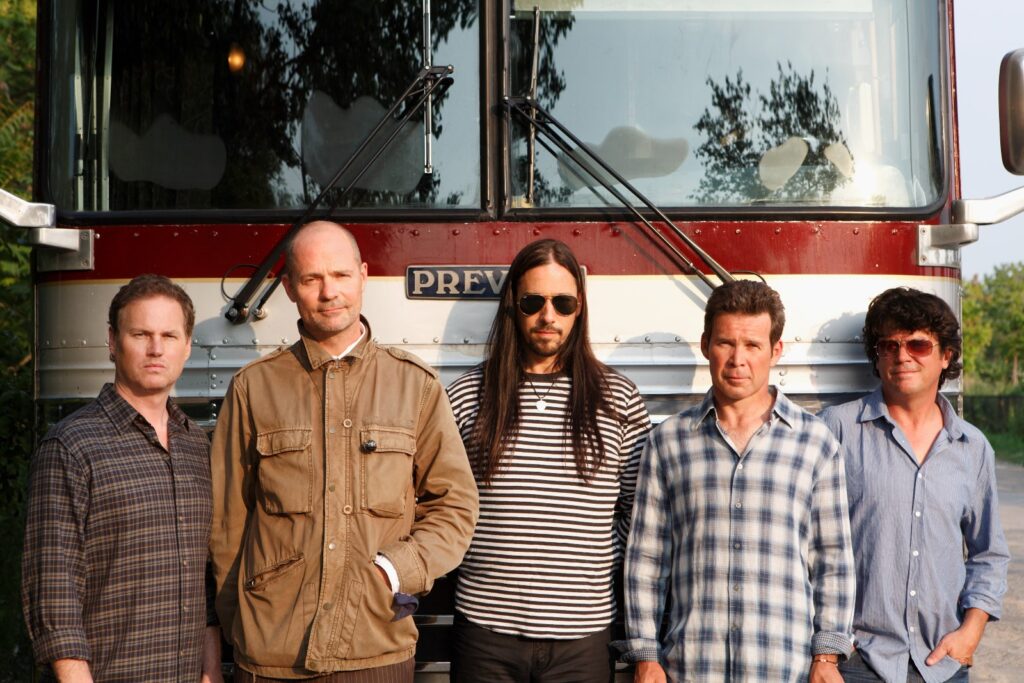
Canada’s band?
No Dress Rehearsal doesn’t claim that The Tragically Hip is Canada’s definitive band, and Downie and Gold admit that no one musical group can encapsulate a nation. “What we tried to do through the four episodes was lay out the relationship that the band had with the country, and in many cases, how people across the country saw themselves in these songs and these stories,” says Downie.
Gold says it was a question they confronted. “When we presented it to Amazon, it was, ‘Why this band? Why this country?’ That was the question we were trying to answer, because every documentary needs to have a question and then an answer.”
Downie adds that one can see those threads in the music of Joni Mitchell or Neil Young that wrestles with “the space of the North.” One can easily tie the notion to Leonard Cohen, A Tribe Called Red, Tanya Tagaq, Céline Dion, or Drake—musicians who speak to diverse Canadian experiences.
“Do they represent Canada?” asks Downie. “No, and they certainly never tried to. But for many Canadians, do they hold a place in their hearts? Yeah, and it’s complicated, but it has to do with emotional attachment to the land, to the people. It takes confidence to do that, especially when you’re a young band”
“People always say that Canada gave Rush to the world, but we kept the Hip for ourselves,” adds Gold.
Rush frontman Geddy Lee appears in the documentary, too. He seems just fine with that deal.




